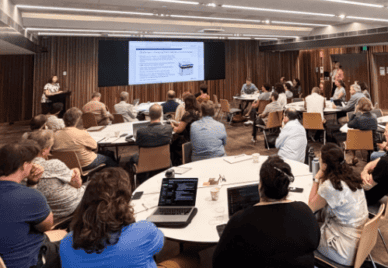
Workshop Addresses Wildlife Camera Trap, Ecoacoustic and Drone Data Challenges
Exploreabout Workshop Addresses Wildlife Camera Trap, Ecoacoustic and Drone Data Challenges
Registries for human cancers have existed since the 1940s, helping researchers and clinicians understand how common different types of cancer are, risk factors, and the best way to treat different types of tumors.
Yet there is no such registry for our closest non-human companions; our pet dogs and cats who share our homes (and often the food from our tables), and who also suffer from cancer. Data about cancer in pets could improve cancer outcomes for our closest companions, and for humans as well.
“We have 5 million pet dogs in Australia. Usually, 1 in 3 dogs experience cancer in their lifetime. So what we are losing is 2 million cases of cancer data that have not been analysed at all,” says Dr Chiara Palmieri, Associate Professor in Veterinary Pathology at the University of Queensland, and the leader of a new Australian Research Data Commons (ARDC) National Data Assets project, Australian Companion Animal Registry of Cancers — ACARCinom.
“So why is that important? Because if you ask me the question “What’s the most common tumor in dogs in Australia?” I don’t know the answer.
“What are the risk factors of specific tumors in dogs? Which age group, which breed is more at risk of specific tumors? If there is a trend in one particular population we don’t have that information in a standardised way.”
For the first time in the world, a database of dog and cat cancer occurrences in Australia that will collect standardised data from pathology labs and universities in real-time is being created via an ARDC-supported project, ACARCinom. The database will help answer the questions around companion animal cancers plaguing veterinary researchers, epidemiologists and clinicians.
Six university veterinary schools and Australia’s 2 leading veterinary pathology providers are partnering in the ACARCinom project. The project is led by the University of Queensland, partnering with universities QUT, University of Sydney, James Cook University, University of Adelaide and Murdoch University, and with veterinary pathology providers Gribbles Veterinary Pathology and IDEXX.
“In the past there have been a few sporadic attempts to create veterinary cancer registries, but they have been short lived, and not well thought out in terms of how to collect data, provide data to stakeholders, and create a common language,” explains Chiara.
“We will create a system that collects real-time data on cancer in animals. There is a big gap in this space.”
The database will connect directly to university veterinary schools and pathology laboratories so data can be fed in real-time. However, connecting the data from the different systems will not be simple.
“The problem with veterinary pathology databases is that they are all different,” explains Chiara. “The first part of the project will be finding out how to talk to the different databases and create a harmonised system for data mining.”
“While the main goal of the project is to create the database, in the process we will develop a common language to simplify veterinary cancer registration.”
ACARCinom will not only benefit our pets. As our dogs and cats share our everyday environment with us, they can act as sentinels of cancer-causing carcinogens around us.
Tumors caused by environmental carcinogens, like hazardous chemicals, develop faster in dogs than in humans. For example, a cancer that takes 5 years to develop in dogs can take 20 years to develop in humans.
Dr Ricardo J. Soares Magalhães, Associate Professor Population Health and Biosecurity at the University of Queensland, explains how ACARCinom will benefit epidemiological research: “An added epidemiological benefit of the project involves the digital data integration of veterinary cancers with existing nationwide projects in human cancers such as The Australian Cancer Atlas for combined epidemiological investigations with a One Health focus [One Health is an approach that recognises that the health of humans, animals and our environment are all interconnected].
“This integrative approach to cancer epidemiological enquiry will represent a paradigm shift in the way we evaluate shared epidemiological risks with the potential to use veterinary cancer data as sentinel for potential human exposures to environmental carcinogens.”
ACARCinom is set to provide valuable insights for researchers in multiple fields, veterinarians, along with the wider community.
For example, veterinary and human health researchers will be able to use the database for comparative oncology, using animal models of cancer.
Veterinarians are also excited by the potential uses of ACARCinom in their everyday practice. Veterinary Oncologist, Dr. Catherine Chan, who runs The Pet Oncologist said: “This project will be helpful to learn about the incidence, risks factors and geographic distribution of cancer in both pets and humans.”
Pharmaceutical companies will have access to data that indicates which type of tumor is most common and therefore focus their efforts on anti-cancer drugs to treat those cancers.
And the wider community and policy makers will benefit through understanding whether there are carcinogens in our environment that may increase the risk of cancer for their pets, as well as themselves.
Learn more about Australian Companion Animal Registry of Cancers — ACARCinom.
The ARDC is funded through the National Collaborative Research Infrastructure Strategy (NCRIS) to support national digital research infrastructure for Australian researchers.